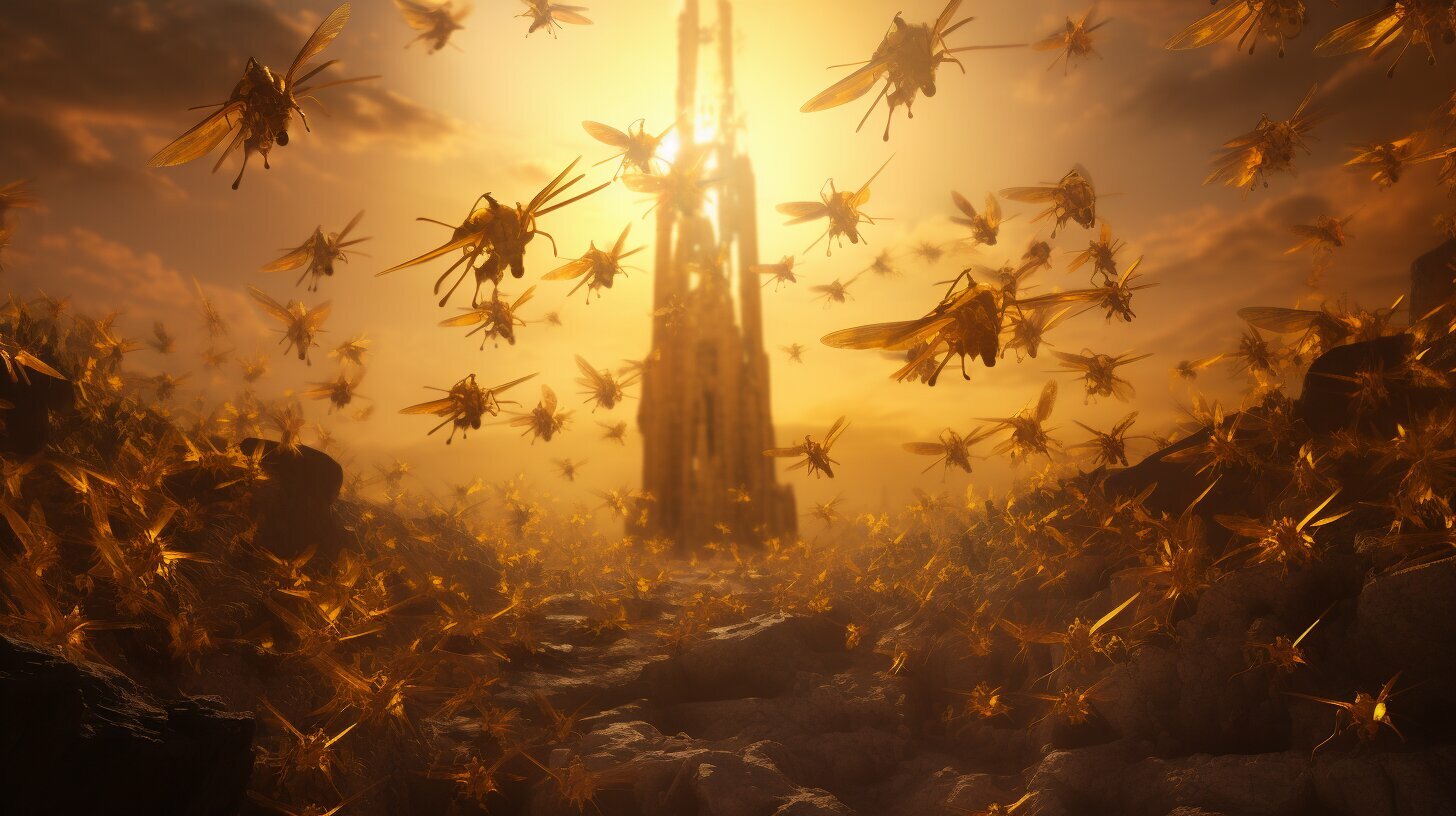Have you ever encountered a locust and wondered about its significance beyond its physical appearance? Locusts hold a deep spiritual meaning in various cultures and belief systems. Their symbolism can offer insights into personal growth, resilience, and adaptability in the face of challenges. Join me as we take a deep dive into the spiritual meaning of a locust and explore its multifaceted symbolism.
Key Takeaways:
- Locusts hold a deep spiritual meaning in various cultures and belief systems.
- Their symbolism can offer insights into personal growth, resilience, and adaptability in the face of challenges.
- Join me as we take a deep dive into the spiritual meaning of a locust and explore its multifaceted symbolism.
Exploring the Biblical Meaning of Locusts
Locusts have been a recurring motif in religious texts for centuries, appearing in both the Old and New Testaments of the Bible. In the Old Testament, locusts are often associated with destruction and judgment, sent as a punishment for disobedience to God. The Book of Exodus recounts the eighth plague inflicted upon Egypt, where locusts were sent to devour crops and ruin agricultural production.
Similarly, the Book of Joel describes a locust invasion as a symbol of God’s wrath, with the insects acting as a metaphor for an impending invasion of enemies. The Book of Revelation in the New Testament describes locusts as a plague upon humanity, with their sharp stingers inflicting torment upon those who do not have the seal of God upon their foreheads.
Exploring the Metaphorical Meaning of Locusts in Religious Contexts
In addition to their literal role as crop destroyers and instruments of divine punishment, locusts also have metaphorical significance in religious contexts. In Judaism, the four types of locusts listed in the Talmud are said to represent four different types of destructive behavior that humans should avoid: arrogance, cruelty, theft, and illicit sexual behavior.
In Islam, locusts are mentioned in the Hadith, with the Prophet Muhammad advising his followers to seek refuge from locusts in the same way they seek refuge from fire. This advice highlights the destructive power of locusts and their potential to cause widespread damage and suffering.
Overall, the biblical meaning of locusts emphasizes their role as agents of destruction and divine retribution, while their metaphorical meanings vary across different religious traditions.

“The sun and the moon grew dark and the stars no longer shone. And the Lord will roar from Zion and thunder from Jerusalem, and the earth will shake. But the Lord will be a refuge for his people, a stronghold for the people of Israel.”
Locusts in Dreams: Interpreting Their Spiritual Significance
Have you ever had a dream where you saw a swarm of locusts? If so, you’re not alone. Locusts are a common symbol in dreams and their spiritual significance can vary depending on the context of the dream and the cultural or religious background of the dreamer.
In many spiritual traditions, locusts are seen as a symbol of destruction and chaos. In dreams, a swarm of locusts may represent a feeling of overwhelm or a sense that something in your life is out of control. It could also indicate a fear of losing something important or a sense of impending doom.
However, in some cultures, locusts are also seen as a symbol of abundance and prosperity. In a dream, a swarm of locusts may represent a time of growth and expansion in your life, especially in areas of business or finance.
It’s important to note that dreams are highly personal and individual, and there is no one-size-fits-all interpretation for any symbol, including locusts. The interpretation of a dream should always take into account the specific details of the dream and the emotional state of the dreamer.
For those who believe in dream interpretation, there are many resources available for exploring the spiritual significance of locusts in dreams. Some suggest that meditating on the symbol of locusts in a dream can help bring clarity and insight into the dreamer’s waking life.
Ultimately, whether you view locusts in dreams as a positive or negative symbol, they can provide valuable insights into your subconscious mind and offer guidance on your spiritual path.

The Symbolic Message of Locusts as Totem Animals
Locusts have been revered as totem animals in many cultures throughout history, each with their unique interpretation of their symbolism. As a totem animal, the locust represents patience, balance, and cooperation. It is a master of adaptation and transformation, representing growth and change. The locust also symbolizes strength, courage, and perseverance, qualities that are essential in navigating life’s challenges.
In Native American culture, the locust is associated with the Fourth Direction, the place where the sun sets, and winter begins. It is believed that the locust is a messenger of change, signaling the arrival of new beginnings and opportunities. The locust is also seen as a symbol of abundance, representing the connection between hard work and reward.
In Chinese culture, the locust is a symbol of fertility and wealth. It is believed that the locust’s constant motion and energy can bring prosperity and good fortune. In Feng Shui, the locust is often used in artwork and decoration to attract abundance and harmony.
The locust also holds significance in African culture, where it is seen as a symbol of hope and new life. It is believed that the locust’s ability to strip the land clean is a metaphor for the power to shed old habits and create space for new growth.
Overall, the symbolism of the locust as a totem animal speaks to the importance of adaptability, perseverance, and transformation in navigating life’s challenges. By embracing the qualities of the locust, we can learn to move with grace and ease through life’s ever-changing cycles.

Decoding the Spiritual Message of Locust Swarms
Locust swarms have been a source of awe, fear, and fascination throughout history, appearing in religious texts and cultural depictions. In the Bible, locusts represented a punishment sent by God to the disobedient people. In ancient Egypt, they were seen as a symbol of destruction and chaos. However, the spiritual message behind locust swarms goes beyond their physical presence as a natural disaster.
Locust plagues are a reminder of the fragility of human existence and the interconnectedness of all life on earth. They demonstrate how quickly everything we take for granted can be destroyed and how we can never become too complacent or dominant in our environment.
The Biblical Meaning of Locust Swarms
In the Bible, locusts were one of the ten plagues that afflicted Egypt, as described in the Book of Exodus. The plague of locusts was seen as a divine punishment for Pharaoh’s refusal to release the Israelites from slavery. Locusts were also mentioned in the Book of Joel as a metaphor for an invading enemy nation and a warning of an impending disaster.
The spiritual lesson behind the biblical meaning of locusts is that disobedience and arrogance towards a higher power will lead to consequences that affect not only the individual but also the community. Locusts symbolize destruction, judgment, and repentance, urging people to turn away from their sinful ways and seek redemption.
The Symbolic Implications of Locust Swarms in Different Cultures
Locust swarms have been observed and recorded in various cultures throughout history. In China, locusts were associated with the underworld and considered a bad omen. In some Native American cultures, they were seen as a symbol of abundance and prosperity, while in others, they represented destruction and famine.
Despite the cultural differences, the spiritual message of locusts remained the same: a warning of impending disaster, a reminder of the cyclical nature of life and death, and a call to action to address the underlying issues that led to the swarms.

The image of a locust swarm might seem terrifying at first, but upon closer examination, it is an awe-inspiring example of the power and resilience of nature. Locusts have adapted to survive in harsh conditions and can travel long distances in search of food and shelter. Their swarms are a natural response to environmental stress and a reminder of the importance of balance and sustainability.
Decoding the spiritual message of locust swarms requires an open mind and a willingness to learn from nature. Their symbolism goes beyond destruction and judgment; it offers an opportunity for growth, change, and renewal. As we face the challenges of our time, we can look to the locusts as a symbol of resilience, adaptability, and the power of collective action.
Unraveling the Spiritual Symbolism of Locusts in Nature
Locusts are not only significant in a cultural or spiritual sense, but they also play an important role in ecosystems. These insects are known for their swarming behavior, which can result in the consumption of entire crops and vegetation in a matter of hours. For many, this behavior is seen as a destructive force, but in nature, it serves a crucial purpose.
As scavengers, locusts help dispose of dead plant material, which is then broken down and returned to the soil. This cycle of decomposition and nutrient recycling helps maintain the health of the ecosystem. In addition, locusts are an important food source for many predators, including birds and reptiles. They are also known to provide humans with a protein-rich food source in times of scarcity.
From a spiritual perspective, the behavior of locusts in nature can be seen as a symbol of transformation and rebirth. The consumption of old vegetation and the recycling of nutrients contribute to the growth of new life, making way for new beginnings. This symbolism can be useful in personal growth and development, reminding us that sometimes we must let go of old ways of thinking and doing in order to make room for new ideas and experiences.

Furthermore, the swarming behavior of locusts in nature can be seen as a symbol of community and collective action. As social creatures, locusts work together to accomplish a common goal, even if it means sacrificing their individual needs for the greater good. This behavior can serve as a reminder of the importance of cooperation and collaboration in achieving shared objectives.
In conclusion, the symbolism of locusts in nature is multifaceted and can aid in our understanding of the natural world and ourselves. Whether we view them as scavengers, disruptors, or symbols of transformation and community, locusts offer us an opportunity to reflect on our own place in the world and the interconnectedness of all living beings.
Embracing the Spiritual Lesson of Locusts
As I reflect on the spiritual significance of locusts, I can’t help but feel a sense of awe and wonder. These seemingly small creatures hold profound spiritual lessons that we can all learn from.
One of the most important lessons is resilience. Locusts are known for their ability to survive in harsh environments and adapt to changing conditions. As spiritual beings, we can learn to cultivate resilience in our own lives by embracing challenges and using them as opportunities for growth.
Another lesson we can take from locusts is the power of community. Locusts often gather in large swarms, working together to achieve a common goal. In the same way, we can benefit from working together with others, supporting each other in our spiritual journeys.
Finally, locusts teach us the importance of letting go. These creatures go through cycles of growth and shedding, constantly renewing themselves and shedding their old selves. As spiritual beings, we too must learn to let go of the things that no longer serve us, making space for new growth and transformation.

Through these lessons and more, locusts can serve as powerful spiritual guides, showing us how to live our lives with purpose and meaning.
The Profound Impact of Locusts in History and Culture
Throughout history, locusts have played a significant role in various cultures and belief systems. They have been both revered and feared, seen as symbols of destruction and renewal, and have been featured in art, literature, and mythology.
In ancient Egypt, locusts were considered sacred and were depicted in hieroglyphs as a symbol of good luck. In the Bible, locusts are associated with plagues and are considered a punishment from God. In Greek mythology, locusts were connected to the god Apollo and were seen as a symbol of music and song.
Locusts have also made their way into popular culture, appearing in movies and literature. One notable example is the 1993 film “Jurassic Park,” which features the fictional concept of genetically-engineered dinosaurs being controlled by a species of locusts.
Despite their often negative connotations, locusts have also been seen as a representation of resilience and adaptability. In some cultures, they are viewed as a source of food, with locusts being a common ingredient in traditional dishes.
Overall, the symbolism of locusts throughout history and culture is complex and multifaceted. It reflects the enduring fascination with these insects and their ability to inspire both fear and wonder.

Conclusion
After exploring the spiritual meaning and significance of locusts, I have come to understand their multifaceted symbolism in various cultures and belief systems. From their appearances in religious texts to their roles as totem animals and their impact on ecosystems, locusts offer rich insights into our spiritual lives.
By decoding the messages of locust swarms and dreams, we can gain a deeper understanding of our own struggles and challenges, and embrace the lessons of resilience and adaptability that these creatures embody. And by examining their place in history and culture, we can appreciate the enduring relevance of locusts’ symbolism in our lives today.
As I conclude this article, I feel a sense of awe and wonder at the spiritual complexity of the natural world around us. Whether we encounter locusts in our dreams, in nature, or in religious texts, their messages offer us valuable insights into our own journeys of growth and transformation. And as we continue to explore the deeper meanings of these creatures, we can discover new dimensions of spirituality and meaning in our lives.
FAQ
Q: What is the spiritual meaning of a locust?
A: The spiritual meaning of a locust varies across different cultures and belief systems. In general, locusts are often associated with transformation, rebirth, and growth. They can symbolize a period of change and transition in one’s life, urging individuals to adapt and embrace new opportunities.
Q: What is the biblical meaning of locusts?
A: In the Bible, locusts are mentioned in several contexts, often representing divine punishment or impending disaster. They are sometimes seen as a symbol of devastation and destruction, serving as a warning or a consequence of disobedience. However, they can also represent God’s power and authority.
Q: What is the spiritual significance of locusts in dreams?
A: Locusts in dreams can have different spiritual significances depending on the context. They may symbolize overwhelming challenges or a swarm of negative emotions. On the other hand, they can also signify an opportunity for growth, urging individuals to face their fears and overcome obstacles in their waking lives.
Q: What does it mean for locusts to be considered totem animals?
A: Locusts as totem animals are associated with certain traits and characteristics. They can represent a sense of purpose, determination, and community. Locust totem animals may guide individuals to embrace their unique talents, work together with others, and adapt to different situations.
Q: What is the spiritual message behind locust swarms?
A: Locust swarms can symbolize the power of collective energy and the need for unified action. They may represent a period of intense change or upheaval, urging individuals and communities to come together, address challenges, and find strength in unity. Locust plagues can also serve as a reminder of the consequences of human actions on the environment.
Q: How can locusts’ symbolism be interpreted in nature?
A: Locusts in nature can be interpreted symbolically as a reminder of the cyclical nature of life, the importance of adaptation, and the balance of ecosystems. They showcase the interconnectedness of all living beings and the need for harmony in the natural world.
Q: What spiritual lesson can be learned from locusts?
A: The presence of locusts can teach us valuable lessons about resilience, adaptability, and personal growth. They encourage individuals to embrace change, overcome obstacles, and find strength in challenging situations. Locusts symbolize the ability to transform and thrive even in the face of adversity.
Q: What is the historical and cultural significance of locusts?
A: Locusts have played a role in various cultures throughout history. They have been depicted in art, literature, and mythology, often symbolizing destruction, change, or spiritual transformation. Locusts have captured the imagination of people across different societies, showcasing their enduring symbolism.




